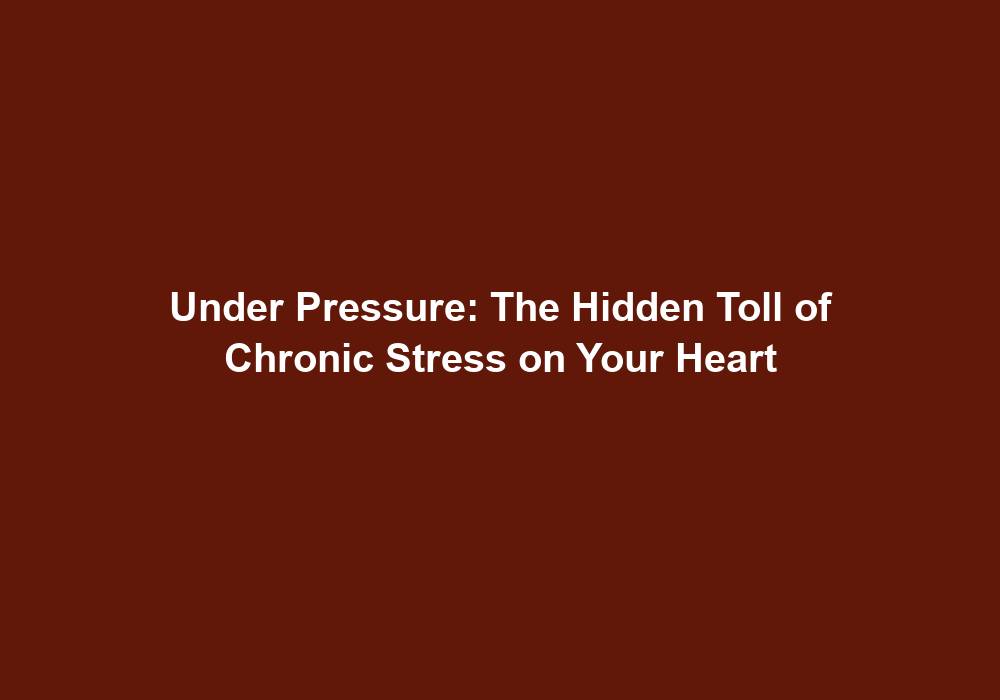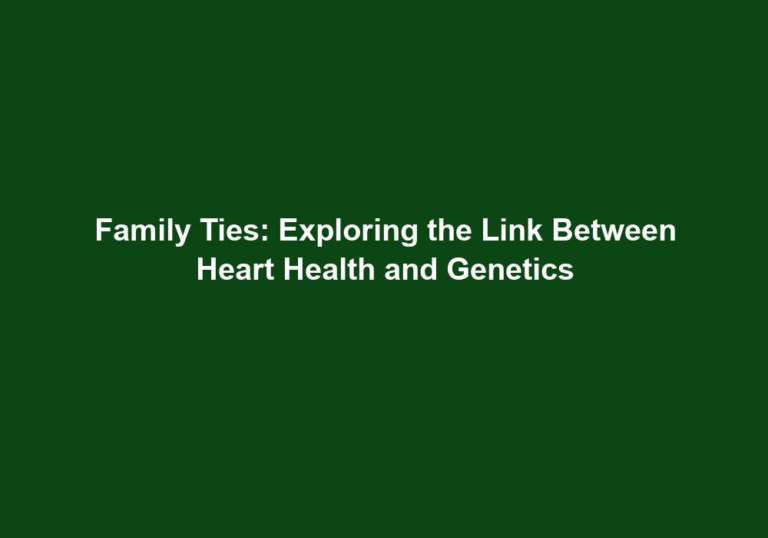Under Pressure: The Hidden Toll of Chronic Stress on Your Heart
Chronic stress has become a prevalent issue in today’s fast-paced world. The constant demands and pressures of daily life can take a toll on our mental and physical well-being, particularly on our heart health. In this article, we will explore the hidden consequences of chronic stress on the heart and provide valuable insights on how to manage and reduce stress for a healthier heart.
The Link Between Stress and Heart Health
Stress triggers a chain reaction of physiological responses in our bodies, including the release of stress hormones such as adrenaline and cortisol. While these hormones are essential for survival in acute stressful situations, prolonged exposure to them can have detrimental effects on our cardiovascular system.
Impact on Blood Pressure
One of the most significant effects of chronic stress on the heart is the increase in blood pressure. Stress hormones cause blood vessels to constrict, resulting in elevated blood pressure levels. Over time, this persistent elevation can lead to hypertension, a major risk factor for heart disease and other cardiovascular complications.
Chronic stress not only raises blood pressure but also contributes to a condition known as “white coat hypertension.” This phenomenon refers to the temporary increase in blood pressure levels when visiting a healthcare professional due to stress and anxiety. Additionally, individuals experiencing chronic stress may also engage in unhealthy behaviors such as smoking or excessive alcohol consumption, which further elevate blood pressure levels.
To effectively manage blood pressure and reduce the risk of heart disease, it is crucial to implement lifestyle changes that address chronic stress. These changes may include adopting stress-reduction techniques, engaging in regular physical activity, and following a balanced diet.
Inflammation and Arterial Damage
Chronic stress also activates the body’s inflammatory response, leading to increased production of pro-inflammatory molecules. This chronic inflammation can damage the inner lining of blood vessels, promoting the formation of arterial plaques. These plaques restrict blood flow and increase the risk of heart attacks and strokes.
In addition to arterial damage, chronic stress has been linked to the development of atherosclerosis. Atherosclerosis occurs when fatty deposits, such as cholesterol, accumulate in the walls of arteries, narrowing them and reducing blood flow. This condition is a significant contributor to heart disease.
To combat inflammation and reduce the risk of arterial damage, incorporating anti-inflammatory foods into your diet can be beneficial. Foods rich in omega-3 fatty acids, such as fatty fish, walnuts, and flaxseeds, have been shown to have anti-inflammatory properties. Additionally, regular exercise can help reduce inflammation and promote cardiovascular health.
Unhealthy Coping Mechanisms
When faced with stress, many individuals adopt unhealthy coping mechanisms such as smoking, excessive alcohol consumption, overeating, or leading a sedentary lifestyle. These behaviors further exacerbate the risk factors associated with heart disease, contributing to weight gain, high cholesterol, and poor cardiovascular health.
Smoking, in particular, poses a significant threat to heart health. It damages the blood vessels, reduces oxygen supply to the heart, and increases the risk of blood clots. Excessive alcohol consumption can lead to high blood pressure, irregular heart rhythms, and weakened heart muscle.
To break free from unhealthy coping mechanisms, it is essential to identify alternative strategies for managing stress. Engaging in regular physical activity, practicing relaxation techniques, and seeking support from loved ones or support groups can provide healthier outlets for stress relief. Additionally, adopting a balanced diet and maintaining a healthy weight are crucial for overall cardiovascular well-being.
Recognizing the Signs of Chronic Stress
To effectively manage and mitigate the impact of chronic stress on the heart, it is crucial to recognize its signs and symptoms. Here are some common indicators of chronic stress:
- Persistent fatigue and exhaustion: Chronic stress can leave individuals feeling constantly tired and drained, even after a full night’s sleep.
- Insomnia or disrupted sleep patterns: Stress can interfere with sleep, making it difficult to fall asleep or stay asleep throughout the night.
- Irritability, anxiety, or depression: Chronic stress can significantly impact mood, leading to increased irritability, anxiety, or even depression.
- Frequent headaches or migraines: Stress can trigger tension headaches or migraines, causing recurring pain and discomfort.
- Digestive problems, such as stomachaches or ulcers: Stress can disrupt the digestive system, leading to stomachaches, indigestion, or even ulcers.
- Decreased libido or sexual dysfunction: Chronic stress can affect sexual desire and function, leading to a decrease in libido or difficulties in achieving or maintaining an erection.
- Cognitive difficulties, including memory impairment and difficulty concentrating: Stress can impair cognitive function, making it challenging to concentrate, remember things, or make decisions.
If you experience these symptoms on an ongoing basis, it is essential to seek support and implement stress-reduction strategies to protect your heart health.
Strategies for Managing Chronic Stress
Fortunately, there are several effective strategies that can help manage and reduce chronic stress, promoting a healthier heart. Here are some practical tips to incorporate into your daily routine:
1. Prioritize Self-Care
Make self-care a priority by engaging in activities that promote relaxation and rejuvenation. This may include regular exercise, practicing mindfulness or meditation, taking up hobbies, or enjoying quality time with loved ones. Remember that taking care of your own well-being is not selfish but necessary for overall health.
In addition to these activities, it can be beneficial to establish a consistent sleep schedule. Aim for seven to eight hours of quality sleep each night to support your body’s ability to manage stress.
2. Healthy Lifestyle Choices
Adopting a healthy lifestyle can significantly reduce the impact of chronic stress on your heart. Focus on maintaining a balanced diet rich in fruits, vegetables, whole grains, and lean proteins. These foods provide essential nutrients and antioxidants that support heart health.
Avoid excessive alcohol consumption, as it can worsen the effects of stress on the heart and overall health. Quitting smoking is also crucial for reducing the risk of heart disease.
Regular physical activity is another key component of a healthy lifestyle and stress management. Engaging in aerobic exercises, such as walking, jogging, or cycling, can help reduce stress levels, improve cardiovascular fitness, and enhance overall well-being.
3. Stress-Reduction Techniques
Explore various stress-reduction techniques to find what works best for you. This may include deep breathing exercises, progressive muscle relaxation, yoga, or engaging in creative outlets such as writing or painting. Experiment with different techniques to discover what helps you relax and unwind.
Practicing mindfulness and meditation can also be effective in managing chronic stress. These techniques involve focusing on the present moment and cultivating a non-judgmental awareness of thoughts and emotions. Regular practice can help reduce stress and promote a sense of calm and well-being.
4. Support Network
Build a strong support network of friends, family, or support groups who can provide emotional support during challenging times. Sharing your thoughts and concerns with trusted individuals can alleviate stress and provide a fresh perspective on difficult situations.
Consider joining a stress management or therapy group where you can learn additional coping strategies and receive support from others facing similar challenges. Online communities and forums can also provide a sense of belonging and connection.
5. Time Management and Boundaries
Develop effective time management skills to prioritize tasks and avoid becoming overwhelmed. Set realistic goals, delegate responsibilities when possible, and establish boundaries to maintain a healthy work-life balance. Learning to say no when necessary can prevent excessive stress and promote overall well-being.
Consider using tools such as calendars, planners, or time-tracking apps to help you stay organized and manage your time effectively. Prioritize tasks based on importance and urgency, and allocate time for self-care and relaxation.
Conclusion
Chronic stress poses a significant threat to our heart health, but by implementing effective stress management techniques, we can protect and improve our cardiovascular well-being. Recognizing the signs of chronic stress, prioritizing self-care, adopting a healthy lifestyle, and seeking support are essential steps towards reducing stress and safeguarding our hearts. Remember, a healthy heart is not only vital for our physical well-being but also for enjoying a fulfilling and balanced life.







